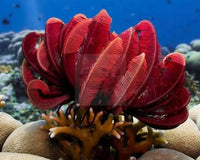Understanding Angel Fish Care
Angel fish, particularly saltwater angel fish, are some of the most beautiful and vibrant creatures found in aquatic environments. These marine marvels can be an exciting addition to any aquarium but require precise care and attention to thrive. This guide offers enthusiasts a thorough overview of how to properly care for these stunning fish, ensuring both their health and happiness.
Choosing the Right Angel Fish
Before diving into the intricacies of angel fish care, it's vital to choose the right species for your aquarium. There are several varieties of saltwater angel fish, including the popular African Angel Fish and the striking Chinese Blueline Angel. Understanding the specific care requirements for each species is essential as some may have unique needs concerning tank size, environment, and diet.
Understanding Their Habitat
Angel fish are native to coral reefs, where they thrive in warm, clear waters filled with a variety of marine life. To replicate this habitat at home, it is crucial to provide a large, well-maintained saltwater tank. A minimum tank size of 70 gallons is recommended for adult angels, while juveniles can start in smaller tanks. Incorporating live rock and coral can also provide essential hiding places and a sense of security for these fish.
Water Quality and Parameters
The health of your saltwater angel fish heavily depends on the quality of the water in their tank. Regular testing must be conducted to maintain the ideal conditions:
- Temperature: Maintain a range between 24°C to 28°C (75°F to 82°F).
- Salinity: Salinity levels should be kept between 1.020 to 1.025 specific gravity.
- pH Levels: Aim for a pH level between 8.1 and 8.4.
- Ammonia and Nitrite: These levels should consistently be at 0 ppm, while nitrates should be less than 20 ppm.
It is important to perform regular water changes—about 10-15% each week—to maintain the water quality and support healthy growth.
We can Supply all you pre-made saltwater Best Aquariums and Saltwater Products UK | Mail Order Fish – Marine World Aquatics
Feeding Your Angel Fish
Feeding saltwater angel fish the right diet is essential for their overall health and vitality. They are generally omnivorous and thrive on a well-balanced diet. A combination of high-quality marine flakes, pellets, frozen foods, and fresh vegetables like spinach and zucchini can be an effective feeding strategy. It’s essential to vary their diet to prevent nutritional deficiencies.
Products such as Blue Queen Angel Fish can also be good indicators of health, as they require similar dietary attention and care.
Tank Mates and Social Dynamics
Angel fish can be territorial, especially when breeding. When selecting tank mates, it is crucial to consider the species and size. Peaceful fish such as clownfish or gobies can coexist with angel fish. However, avoid keeping multiple angels in smaller tanks as this can lead to aggressive behaviour and stress. The French Angel Fish, for example, can demonstrate strong territorial instincts and may require more space to avoid conflicts.
Health Monitoring and Common Issues
Monitoring the health of your saltwater angel fish is vital. Look for signs of stress, reduced activity, or loss of appetite. Regular inspections for visible signs of parasites or diseases such as ich or fin rot can help prevent severe health issues. A common condition in angel fish is known as ‘Angel’s Disease,’ which manifests as a swelling of the stomach. Adequate water quality and a balanced diet are key preventative measures.
Maintaining a Healthy Environment
Creating a stable, healthy environment in your aquarium involves using quality filtration systems and performing regular cleanings. Protein skimmers can aid in removing waste and toxins from the water. Additionally, adding marine plants can help with maintaining oxygen levels and provide natural shelter for the fish.
Breeding Saltwater Angel Fish
Breeding angel fish can be a rewarding experience for enthusiasts. They are monogamous and tend to form strong pair bonds. The ideal conditions for breeding include stable water quality and a well-planted aquarium. Spawning occurs on flat surfaces, so adding ceramic tiles or smooth rocks can facilitate this process. Understanding the behaviour changes during mating seasons can also offer insights into breeding opportunities.
Conclusion
Caring for saltwater angel fish requires commitment, knowledge, and preparation. By following this comprehensive guide, fish enthusiasts can ensure that their beautiful angel fish, such as the Majestic Angel, thrive in a well-maintained and loving environment. Join the ranks of successful aquarists, and let the vibrant beauty of angel fish bring life to your aquatic display!





